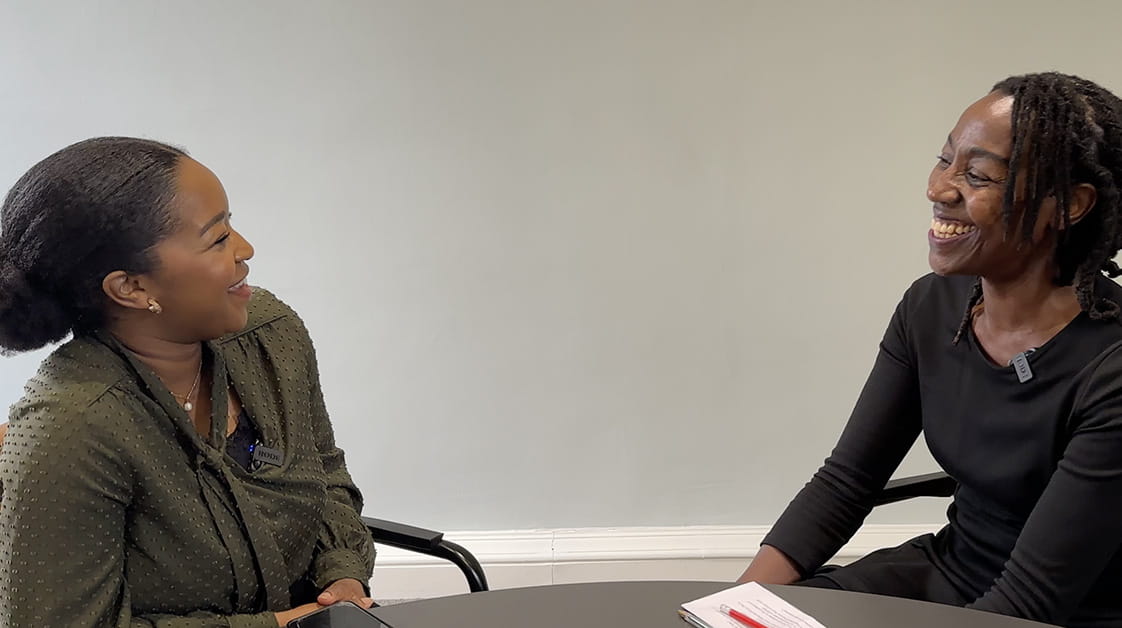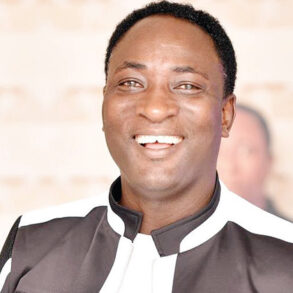
Angela: It’s fair to say I grew up in a socialist family. I partly grew up in an area in Leicester which would have been described as ‘deprived;’ the Windrush generation lived in multi-occupied properties. My family was staunchly working class and their values influenced me.
I was the first person in my family to go to university. My parents and teachers were encouraging and supportive. If my teachers had no expectations because I was the black kid, I wouldn’t be where I am. I think low expectations are still an issue though for many young people.
Mary: I’m also the first person in my family to graduate and do a master’s, and I grew up in Hackney. I didn’t walk out in my cap and gown with a training contract under my belt. I had to navigate my own journey uniquely, it was not easy.
Angela: My background is a big reason I wanted to be a lawyer at a young age. I became politically active at school. It was the 70s and several political organisations spoke out against racism because overt racism was more prevalent. My sister Donna was involved in setting up Leicester’s first law centre that I volunteered at. From there, it was natural for me to go into social welfare.
I saw an advert in the feminist magazine Spare Rib looking for a qualified lawyer. I wrote to the principal as an undergraduate looking for articles (training contract). At that time, it was very difficult for black graduates to get articles, but because of my principal Gill Butler, I had quite a gentle experience.
I never had any desire to go into corporate law. When I qualified, I applied to Hackney Law Centre. At that time, there was a really diverse voluntary sector – the range of community groups and charities was incredible. I developed my love and passion for education law and started representing young people, particularly black boys excluded from schools.
But, just because we’re black, it doesn’t mean we can only go down one path. If we want true representation, we need to be reflected in different legal sectors. Black graduates should have the same choices available to them as their white counterparts.
Mary: I agree! What initially inspired me to go into the legal industry was actually human rights, ironically. The documentary In the Name of the Father depicted the lawyer, Gareth Pierce, who brought justice for the people wrongly convicted of planting a bomb in Guildford. The sense of justice really resonated with me. Even though I’m not in that sector, when I was in private practice (at Mishcon de Reya), I took part in the Black Justice Project, where I did get the opportunity to demonstrate those skills and serve in that capacity.
But now, intellectual property really interests me because I see myself as a creative person, not just a lawyer. More people are building their own businesses, and I think it’s important people understand how to protect their creations.
Angela: I chose to work in an environment that was perhaps more accepting of me, which meant I didn’t face particular barriers. At the law centre, for 13 years we worked as a collective because in that era the voluntary sector was much stronger. That’s now almost defunct.
I didn’t think partnership was something I couldn’t aspire to. A firm that I previously worked at, Fisher Meredith, had several African-Caribbean and other minority ethnic individuals who had senior positions over the years. It’s important to know your worth and what you’re entitled to.
Mary: Yes, the organisation you’re in plays a huge part. I was intentional when I applied for training contracts. I didn’t apply to many places; I looked at social mobility, and real diversity and inclusion. When I came in, I saw the difference.
Natural hair is something that was not always seen as appropriate or professional. That’s why the Halo Code is so important. It’s a code for organisations to ensure they don’t discriminate against us for our natural hair. It sounds dramatic, but there have been cases where people have been told off for showing up to a meeting with natural hair.
Angela: I actually brought the Cornrow School Exclusion case in 2011. An 11-year-old boy was excluded within an hour of attending school because his hair was in braids. It contravened an unwritten uniform policy preventing boys from wearing braids or cornrows, with no exception for black children who might wear these hairstyles for cultural reasons.
I wouldn’t accept any employer telling me that I can’t wear my hair naturally. I know I’m in a privileged position because my firm Irwin Mitchell is signed up to the Halo Code and it’s made very clear that employees should feel they can come to work and be their authentic self.
What’s important is choice. Many black sisters choose to straighten their hair or wear weaves but it’s unacceptable for anybody to tell a black woman she cannot wear her hair naturally. The Equality and Human Rights Commission brought in a code for schools, but there needs to be an equal focus in the workplace.
We’ve got change at our fingertips. We’ve had our first president of colour at the Law Society, I. Stephanie Boyce, and [our first Asian and Muslim president] Lubna Shuja. The strong statement Stephanie made when she was appointed was that she intended to leave a profession that’s more diverse than the profession she entered. It was brilliant in terms of other individuals’ ability to aspire.
Gender diversity has improved, but we need to think about intersectionality. It’s great that over half of solicitors are women, but I was recently in the Royal Courts of Justice and walked past an exhibition as I was leaving; none of the posters of female judges were women of colour, which was frustrating.
The issue around retention of black and minority ethnic practitioners still persists. After George Floyd, a lot of employers put out anti-racist statements and there have been quite a few initiatives from that. But really, the test is about longevity and long-term impact.
We’re not here to provide all the education. Organisations have started thinking about genuine allyship. But it’s important that our allies raise issues and put their necks on the line, so it isn’t always the black person in the room. I don’t feel grateful; I shouldn’t have to feel grateful. But I acknowledge and recognise when this happens.
Mary: I agree, we’re not saviours. I hope to see more women of colour entering and staying in the profession. I want to see people like me progressing to partnership and tangibly having a seat at the table. You can put someone on a poster or employ someone as a trainee but give it five years and see what happens.
This post was originally published on this site be sure to check out more of their content.







